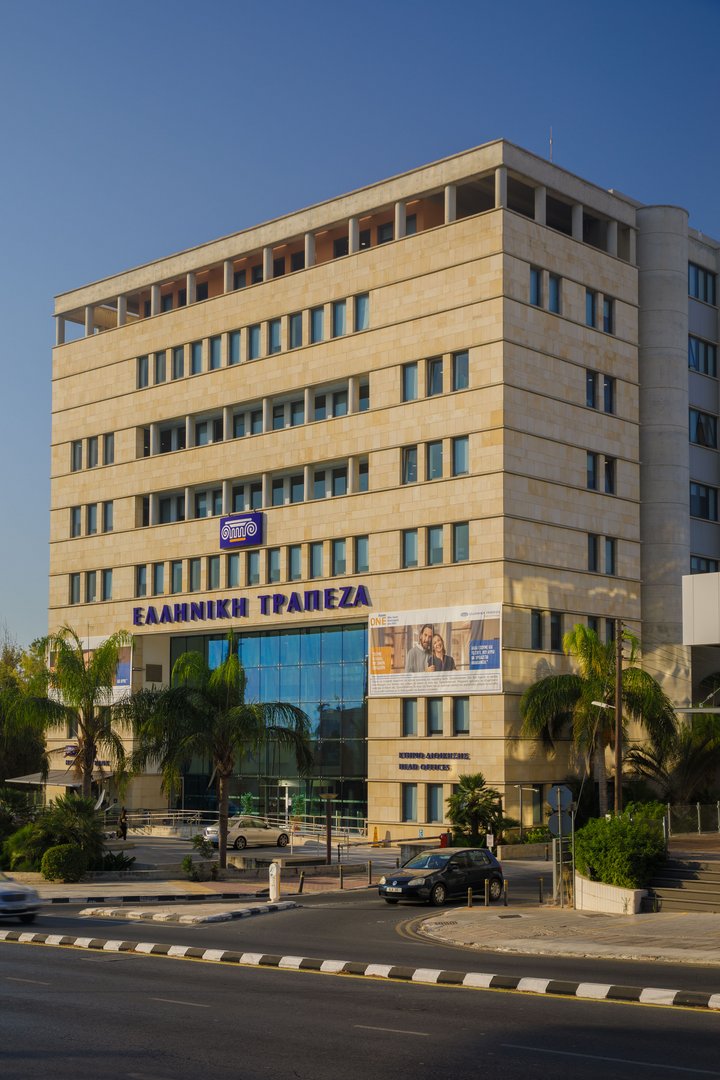Hellenic Bank on Thursday posted its financial results for the previous year, showing a loss of €11.7 million for 2021.
This primarily reflects impairment losses related to the completion of Project Starlight, the bank’s sale of a non-performing exposures portfolio with a value of €0.7 billion.
In addition, the bank posted a net interest income of €256 million, impairment losses of €108.4 million, as well as €908 million in total new lending approved during 2021.
“In 2021, despite the challenges relating to the pandemic and its side effects, we have seen a strong economic rebound underpinned by the government support package,” Hellenic Bank CEO Oliver Gatzke said.
“At Hellenic Bank, we managed to demonstrate resilience and agility, during these extraordinary times, and I am proud of my colleagues, who have risen to the occasion and adapted to the new situation as it evolved,” he added.

File photo: Hellenic Bank CEO Oliver Gatzke at the Banking Forum in Nicosia (photo credit: IMH)
Regarding the bank’s capital position, Hellenic Bank’s CET1 ratio and capital adequacy ratio stood at 19.3 per cent and 21.7 per cent respectively, both well above minimum regulatory requirements.
Furthermore, the bank also has abundant liquidity, with its Liquidity Coverage Ratio (LCR) currently standing at 499 per cent, significantly higher than the 2021 EU average of 172.4 per cent.
“With a robust capital adequacy ratio of 21.7 per cent and liquidity coverage ratio of 499 per cent at the end of 2021, we remain committed to supporting our customers and providing financing to sectors that increase the competitiveness and productivity of the economy, such as health, education, energy, ICT, hospitality, transportation and shipping,” Gatzke said.
“This is underlined by the recently announced agreement to acquire a €556 million well collateralised, performing, corporate loan portfolio from RCB Bank, which is fully aligned with our growth strategy to enhance our client base and the income from our performing portfolio,” he added.
The RCB portfolio had a gross book value of approximately €556 million, while the related cash collateral and other credit balances, as well as the letters of guarantee, had a value of €89 million and €23 million respectively.
The agreement reached by the banks also involved the transfer of up to 16 RCB Bank employees, responsible for managing the portfolio prior to its sale, to Hellenic Bank.
Regarding the bank’s loan portfolio quality, the bank continued its balance sheet clean-up through organic and inorganic means during 2021, including the aforementioned €0.7 billion NPL sale through Project Starlight.
The deal also included the sale of the bank’s servicing platform APS Debt Servicing to Pacific Investment Management Company LLC (PIMCO).
Furthermore, the bank’s pro-forma NPE ratio stands at 3.6 per cent, while this is expected to fall at approximately 3.4 per cent following the NPE sale, as well as the completion of the RCB Bank loan portfolio acquisition.
“Our loss for the year 2021 amounted to €11.7 million which was mainly attributed to extraordinary impairment losses in relation to Project Starlight, the envisaged sale of a €0.7 billion of gross non-performing loan portfolio,” the bank’s CEO explained.
“The sale of this portfolio will lead to a drastic improvement of our asset quality with a pro-forma NPE ratio of less than 5 per cent, excluding the NPEs covered by the APS agreement,” he added.
In terms of Hellenic Bank’s medium-term objectives, the bank said that it is aiming to reach an NPE ratio of approximately 3 per cent, while also achieving new lending of more than €1 billion per year.
The bank is also seeking to raise its net loans to deposits ratio to more than 55 per cent, as well as bring its cost to income ratio below 60 per cent.
“Cost reduction, restructuring and rightsizing of the bank are some of the main components of our 3-year transformation plan,” Gatzke said.
“Especially the reduction of the high cost to income ratio of our bank remains pivotal and is something that must be decisively addressed,” he added, explaining that the bank is focusing its efforts on both increasing interest income through new lending, generating miscellaneous income, as well as containing all administrative expenses.
Moreover, the Hellenic Bank CEO stressed that the most effective way to reduce the cost to income ratio is the overall reduction of the bank’s payroll cost by reducing the bank’s staff, as well as implementing more reasonable salary increases in the future.
“We are doing our best, to agree on a mutually beneficial collective agreement for our staff and at the same time to maintain the bank on a solid and sustainable path,” Gatzke said.
“I really hope that the leadership of the union will rise to the occasion and demonstrate a constructive stance, for the benefit of our employees,” he added, referencing the negotiations with the bank employees’ union Etyk.
The bank’s results also recapped recent developments in the Cypriot economy, including the growth in real GDP by 5.5 per cent year-on-year during 2021, something which will be further supported by the Recovery and Resilience Facility (RRF).
However, the bank noted that Cyprus’ short-term outlook has become somewhat uncertain due to the current geopolitical crisis.
“We also remain cognisant and wary of the negative impact relating to the war in Ukraine, the possible inflationary pressures due to higher prices in energy, raw materials and agri-food products, and also of the uncertainty that the ongoing pandemic continues to cause,” Gatzke said.
Regarding the geopolitical situation, the bank revealed in March that it has negligible direct exposure to Russia.
Aside from two representative offices in Russia and one in Ukraine, Hellenic Bank does not have any commercial operations in the two countries.
The representative offices were tasked with providing administrative support and have no licences for banking services of any kind.
Furthermore, the bank has no exposure to either the Russian sovereign fund or to any Russian banks that are currently being sanctioned.
“We have been actively engaging with our customers since the beginning of the pandemic, working together to provide financing solutions in this demanding environment,” the bank’s CEO stated.
“The bank stands by its customers at these very difficult times and during 2021 supported the recovery of the economy with €908 million of new loans, generating Group net interest income of €256 million and Group non-interest income of €103 million for 2021,” he added.
Regarding the future, Gatzke stated that the bank is in the process of becoming more customer-centric, while also aiming to improve customer experience through digitisation and more streamlined procedures.
In addition, the bank is seeking to further improve its loan book through healthy growth, with a particular focus on ESG projects (Environmental, Social and Governance).
Meanwhile, Hellenic Bank was also upgraded by ratings agency Moody’s on Wednesday, with the bank’s long-term deposit ratings being lifted from B1 to Ba3, while the outlook on the bank’s long-term deposit ratings was affirmed as positive.
“The upgrade of Hellenic Bank’s ratings and assessments reflects the significant improvement in the bank’s asset quality following its agreement to sell a portfolio of nonperforming exposures (NPEs) with a gross book value of €720,” the agency said.
Moody’s noted that the bank expects to complete the transaction, which is subject to regulatory approvals, by the end of 2022.
“Hellenic Bank’s ratings continue to also capture its strong, retail deposit-based funding and ample liquid assets,” Moody’s said.
The positive outlook on Hellenic Bank’s long-term deposit ratings reflects Moody’s expectations that Hellenic Bank will continue to reduce total NPEs, while maintaining capital and liquidity buffers well above regulatory minimums,” the agency added.
Furthermore, Moody’s explained that the positive outlook also reflects the possibility of further improvement in the operating environment, noting that this could lead to the agency concluding that a lower portion of the bank’s liabilities are at a risk of loss in the event of a resolution.
The agency added that this would be reflected in Moody’s assigning a higher macro profile score for Cyprus.
Regarding a possible future upgrade, Moody’s said that all of Hellenic Bank’s ratings could be upgraded if Hellenic Bank manages to further improve its asset quality and strengthen its profitability, while maintaining solid capital and liquidity metrics.
“The ratings could also be upgraded if Moody’s concludes that the impact of the coronavirus pandemic and Russia’s invasion of Ukraine will not leave any lasting damage on the Cypriot economy, which may, in turn, lead Moody’s to decide that a lower portion of the bank’s liabilities are at a risk of loss in a resolution,” Moody’s said.
“Given the positive outlook, it is unlikely that there will be a downgrade to the bank’s ratings in the next 12-18 months,” the agency concluded.







Click here to change your cookie preferences